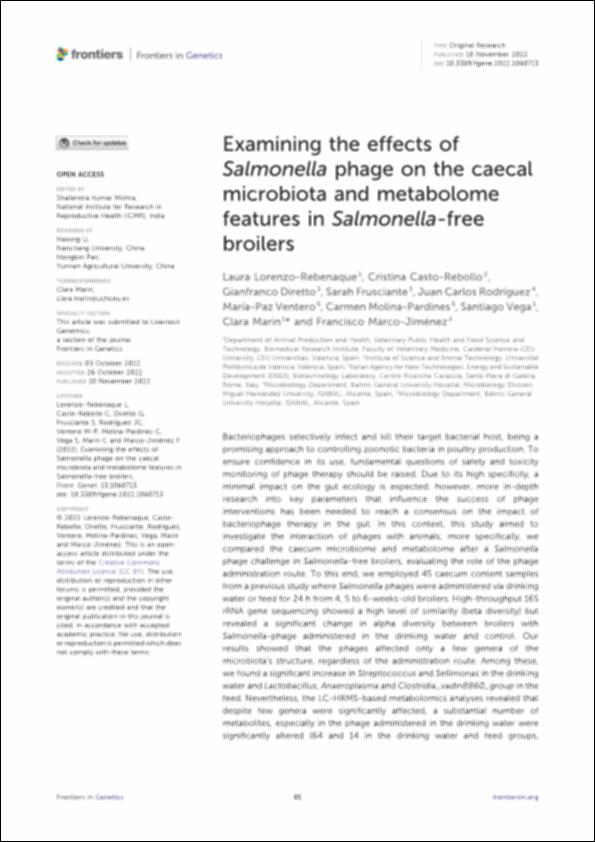Por favor, use este identificador para citar o enlazar este ítem:
http://hdl.handle.net/10637/14255Examining the effects of "Salmonella" phage on the caecal microbiota and metabolome features in "Salmonella"-free broilers
| Título : | Examining the effects of "Salmonella" phage on the caecal microbiota and metabolome features in "Salmonella"-free broilers |
| Autor : | Lorenzo Rebenaque, Laura Casto Rebollo, Cristina Diretto, Gianfranco Frusciante, Sarah Rodríguez Díaz, Juan Carlos Ventero, María Paz Molina Pardines, Carmen Vega García, Santiago Marín Orenga, Clara Marco Jiménez, Francisco |
| Materias: | Pollos - Enfermedades infecciosas - Control.; Chickens - Communicable diseases - Control.; Bacteriophages - Therapeutic use.; Bacteriófagos - Uso terapéutico.; Salmonelosis en los animales.; Salmonellosis in animals. |
| Editorial : | Frontiers Media |
| Citación : | Lorenzo-Rebenaque, L., Casto-Rebollo, C., Diretto, G., Frusciante, S., Rodríguez, J. C., Ventero, M. P., Molina-Pardines, C., Vega, S., Marin, C. & Marco-Jiménez, F. (2022). Examining the effects of "Salmonella" phage on the caecal microbiota and metabolome features in "Salmonella"-free broilers. Frontiers in Genetics, vol. 13, art. 1060713 (10 nov.). DOI: https://doi.org/10.3389/fgene.2022.1060713 |
| Resumen : | Bacteriophages selectively infect and kill their target bacterial host, being a promising approach to controlling zoonotic bacteria in poultry production. To ensure confidence in its use, fundamental questions of safety and toxicity monitoring of phage therapy should be raised. Due to its high specificity, a minimal impact on the gut ecology is expected; however, more in-depth research into key parameters that influence the success of phage interventions has been needed to reach a consensus on the impact of bacteriophage therapy in the gut. In this context, this study aimed to investigate the interaction of phages with animals; more specifically, we compared the caecum microbiome and metabolome after a Salmonella phage challenge in Salmonella-free broilers, evaluating the role of the phage administration route. To this end, we employed 45 caecum content samples from a previous study where Salmonella phages were administered via drinking water or feed for 24 h from 4, 5 to 6-weeks-old broilers. High-throughput 16S rRNA gene sequencing showed a high level of similarity (beta diversity) but revealed a significant change in alpha diversity between broilers with Salmonella-phage administered in the drinking water and control. Our results showed that the phages affected only a few genera of the microbiota’s structure, regardless of the administration route. Among these, we found a significant increase in Streptococcus and Sellimonas in the drinking water and Lactobacillus, Anaeroplasma and Clostridia_vadinBB60_group in the feed. Nevertheless, the LC-HRMS-based metabolomics analyses revealed that despite few genera were significantly affected, a substantial number of metabolites, especially in the phage administered in the drinking water were significantly altered (64 and 14 in the drinking water and feed groups, respectively). Overall, our study shows that preventive therapy with bacteriophages minimally alters the caecal microbiota but significantly impacts their metabolites, regardless of the route of administration. |
| Descripción : | Este artículo se encuentra disponible en la siguiente URL: https://www.frontiersin.org/articles/10.3389/fgene.2022.1060713/full Este artículo de investigación pertenece a la sección "Livestock Genomics". |
| URI : | http://hdl.handle.net/10637/14255 |
| Derechos: | http://creativecommons.org/licenses/by/4.0/deed.es |
| ISSN : | 1664-8021 (Electrónico) |
| Idioma: | es |
| Fecha de publicación : | 10-nov-2022 |
| Centro : | Universidad Cardenal Herrera-CEU |
| Aparece en las colecciones: | Dpto. Producción y Sanidad Animal, Salud Pública Veterinaria y Ciencia y Tecnología de los Alimentos |
Los ítems de DSpace están protegidos por copyright, con todos los derechos reservados, a menos que se indique lo contrario.


